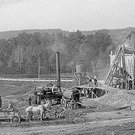‘Sustainable’ is better than ‘development a-go-go’
To the Editor:
I read Robyn Gray’s opinion about needing new blood on Guilderland's town boards with great interest [“Guilderland desperately needs new blood on its boards,” letter to the editor, The Altamont Enterprise, Jan. 28, 2021]. It made me think about our town, where we are in the 21st Century, and why new thinking on these boards may be a good thing.
The more I learn about how much Pyramid’s development project will impact life in Guilderland, the more I wonder why town leaders are so supportive of it. Supportive to the point of carrying Pyramid’s water by joining its lawsuit to overturn the very thoughtful and logical conclusions of Judge Peter Lynch. And this while Pyramid is suing the town to lower its taxes by half. It makes no sense to me.
They say Judge Lynch’s verdict is wrong because they did take a “hard look” at what this project entailed. But have town leaders really taken a hard look at what such massive development would do to our community’s quality of life? Have they considered that this is essentially a plan to urbanize eastern Guilderland? Have they thought through what the impact that 300 to 400 more cars at rush hour on the Route 20 corridor will have on the citizens of Guilderland?
I think the answer lies in the recent article about the appeal of Judge Lynch’s decision [“Guilderland and Pyramid seek to reverse ruling that halted company’s projects,” The Altamont Enterprise, Feb. 8, 2021]. The impression I got is that town leaders have a mindset that development for development’s sake is a good thing. Bigger is better. They claim their decisions are justified by the planning process they themselves created, which seems to look only at economic factors. How to maximize tax revenue.
To me, that planning process reflects a 1950s and 1960s “development a-go-go” mentality. A bigger tax base is the only thing that matters. They don’t see that the judge is questioning their fundamental assumptions. Maybe this project is simply not right for a place like Guilderland. That Guilderland is a suburban/rural community and this project destroys that environment for its citizens. That the implications of this project will not just affect the residents of the immediate neighborhood, but everyone in Guilderland.
I think that this claim of increased tax base for the town is really an illusion. First off, the town may need to make a huge investment in municipal services in order to accommodate this population influx. More police, more judges, more administrators, more teachers, more road maintenance. Far more resources than you would need if this development were appropriately scaled to the town as it is.
Second, Pyramid has consistently resisted paying taxes. It has tried to pass its tax burden to the homeowners of Guilderland. Unlike single homeowners, long the backbone of Guilderland, Pyramid seems to want to reduce its contribution to public good as much as possible, and it has the accountants and lawyers to do it.
In fact, Pyramid is currently trying to lower its assessment from $282.5 million to $143 million. We could well find ourselves with higher town costs because of this development and Pyramid successfully suing not to have to pay for them. What an irony.
We have learned a lot about the downsides of development at all costs since the 1960s. All over the country communities have had to deal with congestion, overcrowded schools, crime, and a myriad of other social ills that Guilderland has largely avoided.
For example, we do not have to sit in miles of bumper-to-bumper traffic to get into Albany like residents of Clifton Park. Part of the value of our property is based on the excellence of Guilderland schools, which are not overcrowded and struggling. Residents here enjoy good quality of life, and that is why we moved here.
I think it is safe to say that the communities that are pleasant and easy to live in maintain the best property values. Just as the phrase “development a-go-go” seems worn and out of date, so is the concept. It has been replaced by such ideas as “appropriate for the community,” “right-sized,” and “sustainable.”
So yes, new thinking is needed. At this point, it looks like the decisions for the future of Guilderland are being made in the boardrooms of the Pyramid Corporation for the benefit of Pyramid.
If existing leaders can look at the facts beyond the economics and continue to keep Guilderland a livable community, that would be great. If not, the citizens of Guilderland must look at how this urbanization will affect us, our kids, our property values, and choose what kind of town we want to live in. Maybe new blood would be beneficial to our future.
John Hughes
Guilderland
